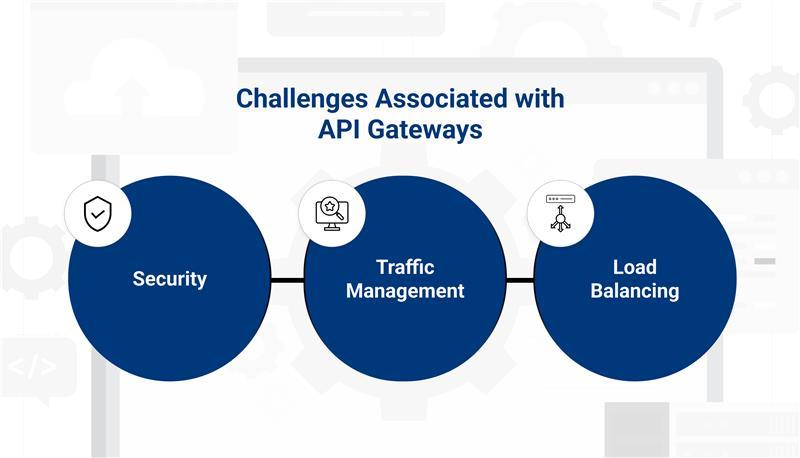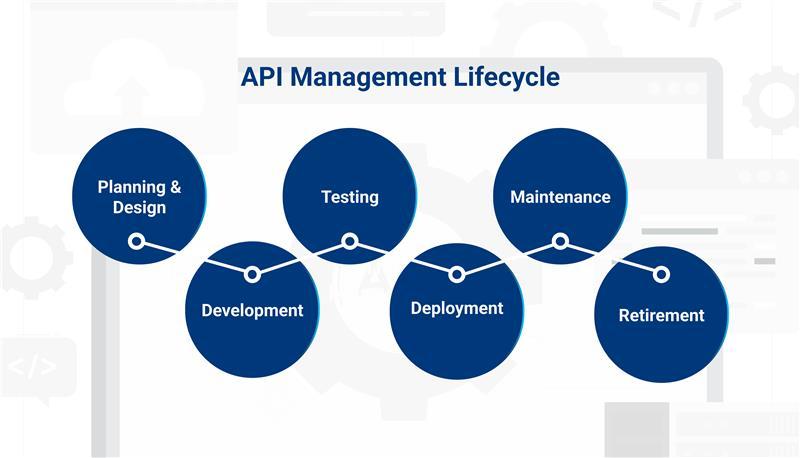API Management
BLOG
11 min read
Embracing the Future with API Management: A Strategic Imperative for Digital Success
As a tech enthusiast, you would be aware of the innovative solution that’s been buzzing in the digital systems – API Management. It’s not just a fancy term; it’s the behind-the-scenes magic that keeps businesses on top of their digital game by addressing the growing complexity and proliferation of APIs.
As businesses begin to rely more on APIs to integrate various software applications and services, the need for a structured approach to managing these APIs become evident. This led to the development of dedicated tools and strategies designed to streamline API creation, maintenance, and governance. Excited to explore more? Let’s not just tech talk but understand how API Management has been propelling businesses to digital success.
What Does API Management Work?
In today's digital landscape, API Management refers to the coordinated activities involved in handling the lifecycle of APIs. This includes designing, implementing, securing, managing, monitoring, and analysing APIs. API Management is not just about ensuring that APIs function correctly; it's about aligning them with business objectives, securing them, and optimizing their performance and usage.
APIs have evolved from simple code libraries to sophisticated interfaces that enable complex interactions between disparate software systems. This evolution has transformed how businesses and applications communicate, breaking down silos and fostering a more interconnected digital ecosystem. The impact of APIs on technology has been profound, catalyzing innovation, and enabling new business models like the platform economy.
Today, APIs are the foundational elements of modern digital infrastructure. They allow different software applications to communicate and share data, enabling the creation of complex, feature-rich digital experiences. APIs have become essential in various industries, from fintech and e-commerce to healthcare and entertainment.
What Makes API Management a Necessity for Gateways?
Ever wondered how API Gateways play a critical role in modern software architectures? Let’s understand how they act as the front door for API requests providing centralized control for security, traffic management, and analytics. Gateways provide a centralized point of control and management for all APIs, handling concerns like security, traffic management, load balancing, and analytics.
Integrating API Management with API Gateways creates a powerful combination that enhances the functionality and efficiency of APIs. API Management brings governance, lifecycle management, and analytics capabilities to the gateway, making it possible to manage APIs more effectively, enforce policies consistently, and gather valuable insights from API traffic.
How API Management Overcome Gateway Challenges?
API Management helps address several challenges associated with API Gateways, including:

Security
Implementing robust authentication and authorization mechanisms to protect APIs from unauthorized access.
Traffic Management
Effectively routing and managing API traffic to prevent bottlenecks and ensure smooth operation.
Load Balancing
Distributing API requests across multiple servers to optimize response times and resource utilization.
What are the Benefits of API Management?
How do well-managed APIs contribute to a seamless digital experience for all? API Management offers a broad spectrum of benefits that enhance the functionality, reliability, and security of APIs. These benefits include:
Improved Security
Enhanced security features to protect sensitive data and prevent breaches.
Operational Efficiency
Streamlined API development and management processes, reducing time-to-market and operational costs.
Better User and Developer Experience
Well-documented and managed APIs result in easier integration and a better experience for both end-users and developers.
API Management significantly improves the experience of both API consumers (users) and producers (developers). For users, it ensures APIs are reliable, performant, and secure. For developers, it provides tools to easily publish, document, and analyse APIs, facilitating a faster and more efficient development process.
API analytics are a critical component of API Management, providing insights into API performance, usage patterns, and consumer behaviour. This data is invaluable for making informed decisions about API improvements, understanding customer needs, and identifying potential issues before they become problems.
In today's competitive digital landscape, API Management can be a key differentiator. By enabling faster deployment of secure and efficient APIs, businesses can respond more quickly to market changes, offer better customer experiences, and innovate more rapidly.
What are API Management Platforms?
API Management Platforms are sophisticated software tools designed to centralize and streamline the management of APIs. They offer an array of functionalities such as API creation, publishing, documentation, security, analytics, and lifecycle management. These platforms serve as a one-stop solution for managing the full array of API-related activities efficiently and effectively.
There is a wide range of API Management tools available in the market, each with its unique strengths. For instance, platforms like Apigee and Azure API Management are known for their comprehensive feature sets and enterprise-level capabilities, while others like Kong and WSO2 offer more flexibility and customization options. A comparative analysis helps businesses align their specific needs with the features offered by these platforms.
The best API Management Platforms offer high levels of customization and adaptability, allowing businesses to tailor the management experience to their unique requirements. This flexibility is crucial for addressing specific business challenges and goals, whether it involves customizing the API gateway, integrating with existing infrastructure, or implementing specific security protocols.
How to Choose the Right API Management Platform for Your Needs?
What factors should you consider when selecting an API Management Platform? Let's break down the decision-making process! Selecting the right API Management Platform requires careful consideration of factors such as the size and complexity of your API landscape, security needs, budget constraints, and specific features like analytics, developer portal capabilities, and integration options. The goal is to choose a platform that not only meets your current needs but can also scale and evolve as your business grows.
How API Management Ensures API Security?
In a world where security is paramount, how does API Management step up? This includes protecting APIs from unauthorized access, ensuring data privacy, and maintaining data integrity. A breach in API security can lead to significant data loss and damage to a company's reputation.
To combat security threats, modern API Management platforms incorporate advanced features like OAuth for authorization, JWT (JSON Web Tokens) for secure data transmission, API keys for access control, and regular security audits. These features build a robust defense against common security threats.
API Management also plays a crucial role in ensuring compliance with various data security and privacy regulations like GDPR, HIPAA, and others. By enforcing compliance standards, these platforms help organizations avoid hefty fines and legal complications.
How API Management Enables Governance and Operational Efficiency?
Effective API governance involves setting up a framework of policies and standards that dictate how APIs should be developed, used, and maintained. This ensures that APIs are consistent, reliable, and aligned with business goals.
Best practices in API governance include defining clear API design principles, ensuring thorough documentation, implementing version control, and monitoring API usage to ensure compliance with set standards and policies.
API Management tools play a vital role in enforcing these governance policies. They provide mechanisms to monitor and control API usage, ensuring that all APIs within an organization adhere to the established governance framework.
What’s API Lifecycle: A Core Aspect of API Management

The API lifecycle management includes stages like planning and design, development, testing, deployment, maintenance, and retirement. Effective management of this lifecycle is crucial for the long-term success and sustainability of APIs.
API Management addresses various lifecycle challenges, such as managing multiple API versions, ensuring consistent documentation, and effectively deprecating outdated APIs.
Tools and techniques for lifecycle management include automated testing and deployment tools, API versioning systems, and performance monitoring solutions. These tools ensure that APIs remain effective and efficient throughout their lifecycle.
How API Management Enables Seamless Integration and Automation?
In the realm of API Management, seamless integration of various systems and services is a common challenge. A robust API Management platform simplifies this process by providing tools that facilitate easy integration with existing IT infrastructure, third-party services, and cloud environments. This ensures that businesses can leverage their APIs to the fullest, achieving a harmonious digital ecosystem.
One of the key benefits of API Management is the automation of repetitive and time-consuming tasks associated with APIs. This includes the automation of API deployments, updates, and monitoring. Automation not only speeds up these processes but also reduces the likelihood of human error, resulting in more reliable and efficient API operations.
The future of API integration and automation is likely to see an increased use of artificial intelligence and machine learning technologies. These technologies promise to make the automation process more intelligent, enabling predictive analytics, enhanced performance tuning, and smarter resource allocation.
API Management platforms are designed to streamline the entire API workflow, from development to deployment and beyond. This includes providing developers with the tools they need to build, test, and release APIs faster and more efficiently, thereby significantly reducing time-to-market for new API-driven features and services.
What are the Key Goals of API Management?
In today's rapidly changing digital landscape, the ability to scale APIs in response to varying demand is crucial. API Management systems offer scalability as a core feature, allowing businesses to efficiently manage spikes in API calls without compromising on performance or reliability.
API Management platforms provide a suite of tools for optimizing API performance. This includes load balancing to distribute API traffic evenly across servers, caching to reduce response times, and throttling to prevent overuse of resources.
Effective load balancing is essential for handling peak performance times. API Management systems enable automatic redistribution of incoming API requests across multiple servers, preventing any single server from becoming a bottleneck.
Continuous monitoring of API performance is another key aspect of API Management. These platforms offer real-time monitoring and alerting capabilities, allowing businesses to quickly identify and address performance issues as they arise.
What is the Impact of API Management on Businesses?
Implementing an effective API Management strategy can have a significant impact on a business's bottom line. By enhancing API security, improving operational efficiency, and speeding up time-to-market, API Management systems can drive significant ROI.
The future of API Management is likely to be shaped by advancements in cloud computing, IoT, and edge computing. These technologies will require even more sophisticated API Management solutions capable of handling increased complexity and security challenges.
Innovation in API Management is continuously evolving, with new approaches being developed to address the ever-changing needs of digital businesses. This includes the use of blockchain technology for enhanced security and the adoption of microservices architectures for greater agility.
Finding it difficult to simplify business operations?
Let’s discuss how API can lead your wayAre You Ready to Adapt the Evolving API Landscape?
As the API landscape continues to evolve, businesses must stay agile and adapt their API Management strategies accordingly. This involves not only embracing new technologies and approaches but also continuously monitoring and adjusting their API strategies in response to emerging trends and challenges.
Embracing API Management is the way forward for businesses seeking to thrive in the digital era. It ensures that APIs, which are vital to digital strategy, are managed effectively, securely, and efficiently.
Get started with Acceliarate’s API Management now - Book a free no obligation call with our experts.


